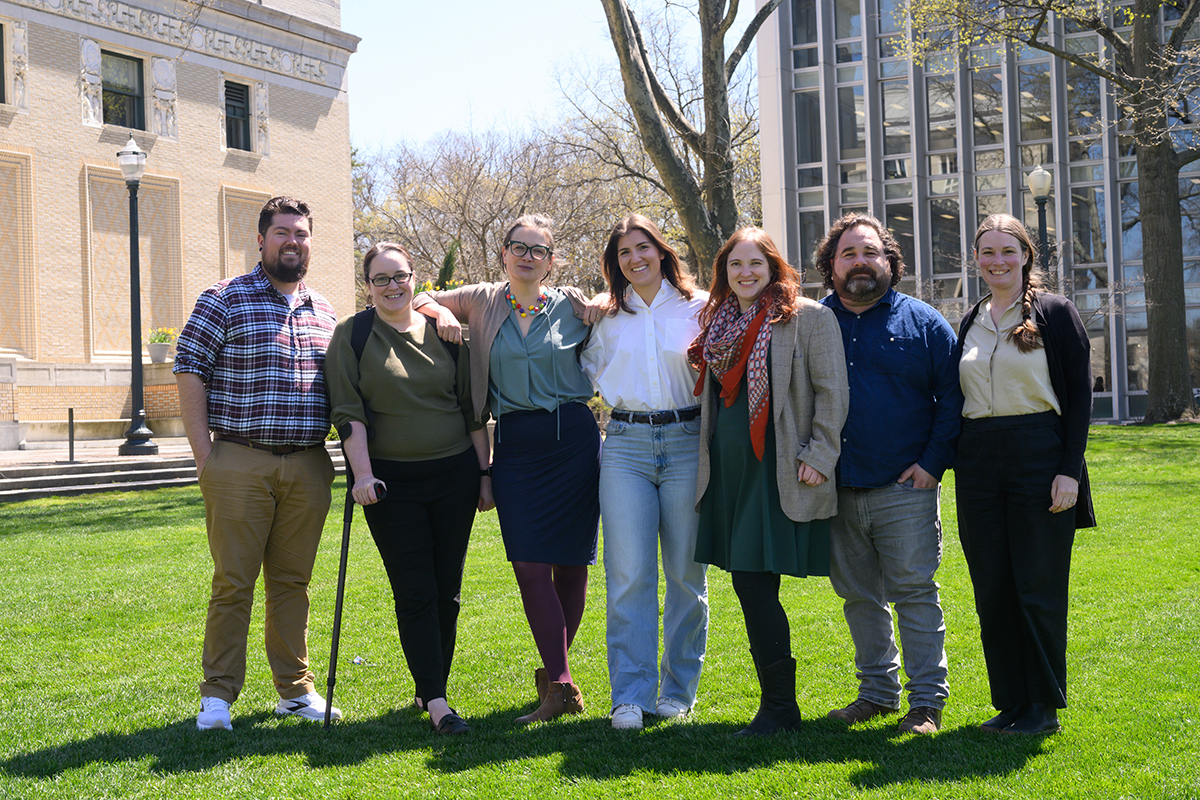
The Open at CMU team at Carnegie Mellon University Libraries supports researchers in making their work more transparent, accessible, and reproducible by providing expertise in open science, open data, open access publishing, and open-source software.
A new national study from the Carnegie Mellon University Libraries is shedding light on how libraries across the U.S. are keeping up with the fast-changing world of open science.
A team led by Carnegie Mellon University Libraries STEM Librarian Kristen Scotti has published the first systematized review of how U.S. academic libraries are enabling, and sometimes struggling with, the demands of open science. Co-authored by Melanie Gainey, Emily Bongiovanni, and Emma Slayton of Carnegie Mellon University Libraries, along with Chenyue Jiao of the University of Illinois Urbana-Champaign, the paper, “Charting Open Science Landscapes: A Systematized Review of U.S. Academic Libraries’ Engagement in Open Research Practices,” appears last month in The Journal of Academic Librarianship.
Open science refers to the practice of sharing research, data, and findings freely with the public. It aims to make science more transparent, easier to reproduce, and open to more people, including students, researchers, and even curious citizens.
Analyzing 3,752 publications spanning 2010 to 2024, the study offers a panoramic view of library-led activities across nine key domains — from open access and open data to citizen science and open innovation.
The data reveal that libraries play a significant role in supporting open science, especially in areas like open access (making articles free to read), digital tools and infrastructure (online data storage and publishing platforms), and research data support (helping with data collection, storage, and sharing). But the study also showed that there are important gaps in this work that still need more attention, including citizen science (getting the public involved in research) and open peer review (making the review process more transparent).
The most urgent need? Ongoing professional development.
“The study shows that librarians are expected to navigate an increasingly technical and collaborative landscape,” Scotti explains. “But without sufficient training, we risk burnout or underdelivery.”
Her findings confirm what many in the field have sensed: open science success doesn’t just hinge on tools and policies — it depends on people. At CMU, that recognition has led to a unique approach.
“At CMU Libraries, we take a process-based approach to open: it’s not just about open-access publishing of the end results, but about opening up research and learning across the board: supporting open workflow tools; encouraging researchers to open source their code; creating open educational resources that facilitate lifelong learning and allow for remixing and reuse anywhere in the world; experimenting with open and formative peer review; communicating key findings in easily understandable and accessible ways and facilitating community-engaged research and citizen science,” said Associate Dean for Academic Engagement Nicky Agate. “And just to be clear: we understand open science in the sense of wissenschaft, or knowledge – it includes the social sciences and humanities too!”
Carnegie Mellon University Libraries is one of the only academic libraries in the country to host a dedicated Open Science Postdoctoral Associate, a role previously held by Scotti and STEM Librarian Chasz Griego. A two-year appointment, with duties split across research, teaching, and outreach, the position reflects a broader commitment to embedding open science expertise across the research lifecycle.
“During my time as the Open Source Postdoc, I developed and led AI-assisted Python workshops to enhance AI and coding literacy, conducted research on academic libraries’ engagement with open science and the application of machine learning in evidence synthesis, and contributed to the Open Science Primer —a national train-the-trainer program led by Emily Bongiovanni to empower librarians to support open science initiatives,” said Scotti.
With a growing team that includes multiple PhD-trained professionals, the Libraries are equipped to support complex research workflows, facilitate cross-campus collaboration, and guide faculty and students through an evolving open ecosystem.
“At Carnegie Mellon University Libraries, open is part of everyone’s job.” said Agate. “Our team’s extensive research experience not only spans fields as varied as Neuroscience, Archaeology, Chemical Engineering, and French Literature, but deep expertise in information science and knowledge architectures—it’s a combination that gives us a deep understanding of the processes and products of research across disciplines, as well as an appreciation for the value of opening those up.”
Libraries aren’t just keeping pace with the future of science, they’re helping shape it. As more government agencies ask for public data sharing and research transparency, especially in fast-moving fields like artificial intelligence, CMU’s approach could serve as a model for other universities.
What makes this work even more powerful is that Scotti’s entire study, data, and methods are open to the public. That means others can learn from it, build on it, and help push open science even further.
This open access study was supported by the Institute of Museum and Library Services, and all corresponding data have been made openly available on OSF. The preprint for the second phase of the systematized literature review, which examines these data at an institutional-level, is also available on the OSF project page.
